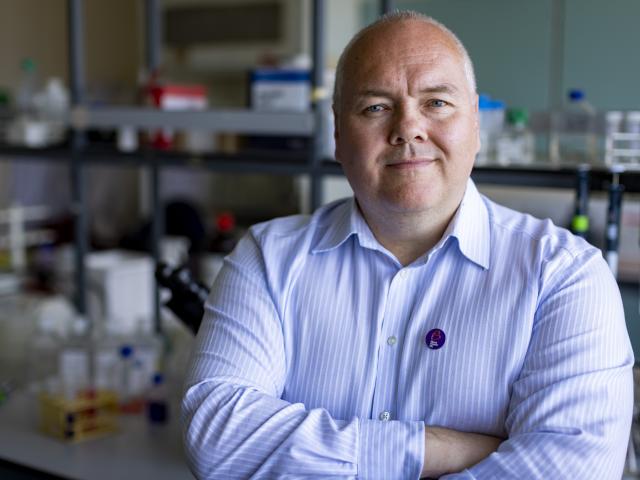
Funding to support “next generation” of scientists in tackling one of the UK’s most common forms of leukaemia
11 April
Funding from Health and Care Research Wales is helping to develop the next generation of blood cancer researchers.
Blood cancer is the fifth-most common cancer in the UK, but its many variations have historically made it notoriously difficult to treat. There are over 100 different types of Acute Myeloid Leukaemia (AML), each caused by a different mutation.
Professor Alex Tonks, of the Division of Cancer and Genetics at Cardiff University, is leading research into a “precision” treatment for AML.
The study focuses on a protein called NFIC which appeared to be significantly higher in blood cancer cells than in non-cancerous cells. Professor Tonks said:
No-one currently knows what this protein does in blood cancer cells, so we would be the first to understand NFIC’s role in how AML develops. Once we have that understanding we can create treatments to tackle it.”
This type of treatment has already been successful in treating another type of blood cancer, Chronic Myelocytic Leukaemia (CML), leading to a significant improvement in survival rates.
The survival rate for patients with CML went from approximately 10% after five years to above 90%. To be able to increase the survival rate to that level and above; that’s the gold standard we want to achieve for all the other blood cancers.”
The funding, managed by the Health and Care Research Wales Faculty, has enabled Professor Tonks to support a PhD student, Owen Hughes. Professor Tonks said:
I’m passionate about supporting early career researchers and teaching the next generation of scientists that will take this research forward and generate those treatments for those patients.”
Owen Hughes said:
My undergraduate studies provided me with a good broad understanding of cancer, but I knew I wanted to study it in more detail. I was drawn to this particular study into the impact of NFIC in AML as I was excited that it could lead to the development of new targeted therapies, improving outcomes for patients. I feel very supported by those around me in the haematology department. I have learned a great deal in a short amount of time and am eager to continue learning. I am extremely grateful to Health and Care Research Wales for funding the project. Without their support I would not have been able to embark on this journey and progress through the early stages of a career in research.”